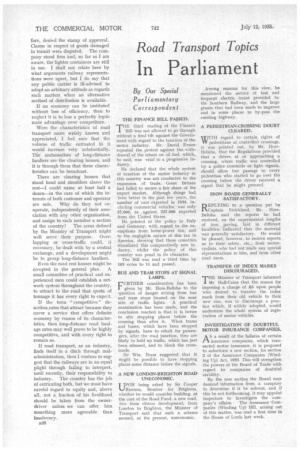Road Transport Topics
Page 40

If you've noticed an error in this article please click here to report it so we can fix it.
In Parliament
By Our Special Parliamentary Correspondent
THE FINANCE BILL PASSED.
THE third reading of the Finance Bill was not allowed to go through without a final tilt against the Government with regard to the taxation of the motor industry. Mr. David Evans repeated the protest against the withdrawal of the rebate on oil fuel, which, he said, was vital to a progressive industry.
He declared that the whole system of taxation of the motor industry in this country was not conducive to the expansion of trade. Great Britain had failed to secure. a fair share of the. export market. Although things had been better in the past few years, the number of cars eirported in 1934, including commercial vehicles, was only 37,000, as , against 237,000 exported from the United States.
He pointed to the policy in Italy and Germany, with. regard to. the exemptions from horse-power tax, and to the negligible nature of this tax in America, showing that those countriesstimulated this comparatively new industry, whilst the' policy of this country was penal in its character.
The Bill was read a third time by 163 votes to 11 and passed.
BUS AND TRAM STOPS AT SIGNAL LAMPS.
FURTHER consideration has been given by Mr. Hore-Belisha to the question of danger arising from bus and tram stops located on the near side of traffic lights. A practical examination has been made, and the conclusion reached is that it is better to site stopping places before the crossing than after it. When trams and buses, which have been stopped by signals, have to rehalt for passengers, after the road junction, they are likely to hold up traffic, which has just been released, and to block the crossroads.
Sir Wm. Brass suggested that it might be possible to have stopping places some distance before the signals.
A NEW LONDON-BRIGHTON ROAD UNECONOMIC.
UPON being asked by Sir Cooper Rawson, Member for Brighton, whether he would consider building, at the cost of the Road Fund, a new road, free from ribbon development, from London to Brighton, the Minister of Transport said that such a scheme seemed, at the present, uneconomic.
• Among reasons for this view, he mentioned the service of fast and frequent electric trains provided by the Southern Railway, and the large grants that had been made to improve and in some places to by-pass the existing highway.
A PEDESTRIAN-CROSSING DOUBT CLEARED.
W/ITH regard to certain rights of W pedestrians at controlled crossings, it was pointed out, by Mr. !ToreBelisha, that the Regulations provided. that a driver, at or approaching a crossing, where traffic was controlled by a police constable or light signals, should allow free passage to every pedestrian who started to go Over the crossing before the driver received a signal that he might proceed.
IRON ROADS GENERALLY SATISFACTORY.
D EPLYING to a question put by Captain Strickland, Mr. HoreBelisha said the reports he had received, on the experimental lengths of iron paving, laid in different localities, indicated that the material was generally satisfactory. He would be pleased, however, to receive reports as to their safety, etc., from motorcyclists, who had not made any special representations to him, and from other road users.
TRANSFER OF INDEX MARKS DISCOURAGED.
THE Minister of Transport informed Mr. Hall-Caine that the reason for imposing a charge of £5 upon people who desired to transfer the index mark from their old vehicle to their new one, was to discourage a practice which, if widely adopted, would undermine the whole system of registration of motor vehicles.
INVESTIGATION OF DOUBTFUL MOTOR INSURANCE COMPANIES.
AS a result of the failures of certain insurance companies, which transacted motor insurance, it is proposed to substitute a new section, for section 2 of the Assurance Companies (Winding Up) Act, 1933. This will strengthen the powers of the Board of Trade with regard to companies of doubtful stability.
By the new section the Board may demand information from a company to determine if it be solvent, and if this be not forthcoming, it may appoint inspectors to investigate the company's affairs. The Assurance Companies (Winding Up) Bill, arising out of this matter, was read a first time in the House of Lords last week.




























































































